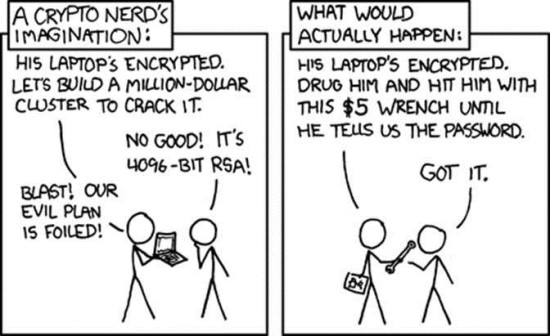As I mentioned some time ago, I haven’t been sitting idly by and watching things around me unfold. I remain keenly aware of what’s happening each day in the over-the-top system we are subjected to.
Every day I read about more public gouging and fraud by corporations, media “pundits” defending absolute and unquestioning subjugation to the immoral “authority” of state who invoke their flimsy “won’t someone think of the children!” line at the same time as they actively work to undermine and criminalize those seeking to ensure children’s welfare (and everyone else trying to do some good). Every day the government ups the ante in contravening and violating rules, laws, and basic justice, directly suppressing people’s Charter Rights and access to the law. That is, of course, when they’re not busy arbitrarily making up new laws to hold us guilty of “crimes” that they invent on the spot.
And if those laws were ever intended as actual protection of citizens and their rights, it’s painfully obvious that they’re being used specifically to terrorize, extort, and control those same citizens and violate their rights — the exact opposite of their stated purpose. And worse, those laws are being perverted through the breaking and violation of other laws, a situation so repellent that it defies words. And the courts hold this aloft as being in all of our best interests while police go to work making sure we’re all “protected” under their benevolent regime. For this they demand our tax money, to be handed over to banking and corporate acquaintances that show a voracious appetite for control and dominance.




Beyond this I have my own decade-long history with the Canada Revenue Agency in a series of what I feel may fairly be described as omissions, lies, and possibly fraud — all documented in an extensive timeline on the government’s own stationary (i.e. stuff they sent me), often complete with signatures of the CRA agent, the timeline involved, authorizing supervisors, etc. It documents numerous Charter Right violations by them and other other members of the CRA. I can now actually claim to have reams of evidence: papers, transcripts, a long reconstructed timeline.
I can directly prove that the CRA has made, at the very least, an error in deciding that I “owed them” $20,000 for the year 2005, which they said carried over from 2004 where I “owed” $0.
Let that sink in for a moment.
If this was a problem, I was told, it’s on me to straighten out (and I’d better pay what they demand in the meantime!) Initially I thought this was related to the personal business I had started so that I could work as a contractor, but the longer it went on, the sketchier it became. I mean, I only made about $55,000 that year which, according to the math means that the CRA had expected me to remit 36% of my earnings (apparently just for EI alone — see below), a number that jumped far higher after numerous re-assessments (and I better pay that too!)
Ten years in and I still have no assessment, just a bunch of “Notices of Assessment” (tricky wording, huh?) that contradict each other and tell me very little in and of themselves. I’ve continuously demanded to know what the CRA claimed I “owed” them for, and only once did I receive the verbal response that it, the initial $20,000, was marked as “EI — maybe Employment Insurance?” somewhere in the history of the file. I asked for that in writing, as well as the agent’s initials or some other identifying feature to prove that this is the information I was asking for.
Eventually, I received yet another Notice of Assessment that notified me that I “owed” $20,000 from 2005, my 2004 “owing” was $0, and the agent’s initials appeared at the bottom (printed). Well, good, then. Guess that’s that.
So, now I’m sitting on many many copies of Notices of Assessments, many in French (a big indicator to me that someone was messing around with my info at the CRA), many with conflicting information (numerous re-assessments made before I ever submitted returns for any of these years), and still not a single one indicating anything except some sort of weirdness at the Canada Revenue Agency.
I deeply suspect the involvement of a since-acquired IT staffing agency at the outset (2004-2005). They refused to send me my T4 and would only provide me with a photocopy which had what looks like sloppy white-out applied to a conspicuous box. Combined with the fact that they demanded that I was an independent contractor even as they sent me a T4 and a Record of Employment (yes, I have these, plus signed contracts, etc.), suggests that they provided the CRA with some interesting “information” too, which the CRA may have decided was perfectly okay and probably also decided that, yeah, I should be treated as an independent contractor.
I’ve since worked for other large IT staffing firms that have similarly tried to circumvent Ontario’s labour laws, readily co-mingling “employee” with “independent contractor” (one place actually used both in the contract wherever they were expedient), treating ignorant contractors like employees and sticking them with the taxes that they should be paying.
I mean, back in my Henderson Bas nightmare I had to explain to my fellow workers that working 80 hours per week is not expected by law, so it’s not surprising that this kind of thing goes on regularly.
I’m assuming that this is how the situation started . The fact that the Canadian government ripped off Canadian taxpayers through the Employment Insurance system at the same time certainly adds a lot more spice to this whole thing — I suddenly owe twenty grand on what I can best ascertain to be Employment Insurance tax, on the same year as the government guts the system?
That “amount owing” quickly grew to $35,000 and by today I’m sure that it’s ballooned to well over $40,000 what with all the fees and extra bells and whistles they like to throw in. In the meantime, the CRA has frozen my assets in very strategic ways — typically on the last day of the month (when I get paid, pay rent, etc.) — because I didn’t cooperate with their extortion demands (which regularly encompass friends and family — “what assets do they have?” “We can seize whatever we need to!”, etc.) By assets, of course, I mean the gaping debts I have elsewhere in my life.
I’m told I have the right to challenge this, I have the right to the correct information in a timely manner, etc. etc.
Right.
I would make arrangements to “repay” with agents only to discover that, a month later, those agents were no longer working on my file, and the new agents determined that I owed now and they weren’t going to wait one damn second longer!
Have you ever tried to remove a government-imposed freeze on all your bank/credit accounts? If you’re not experienced with the wonder of a CRA Requirement to Pay, I hope you never have to experience the stress. It could easily push you into abject poverty and a good deal of despair. Illegal? Not if the government does it! And don’t forget, if the government is preventing you from paying your bills, or rent, or buying food, or whetever, that’s on you, legally or otherwise.
You could always declare bankruptcy. The CRA will be happy to assist with that.
Also fun is when they decide that freezing our accounts is insufficient so they’re just going to start taking 55% of your income (I’m staring at last week’s sickly pay stub right now), and you’ll be notified about it two weeks afterward in a letter saying that you’ve had a fair chance to reply to this notice so now it’s our turn!
At least it’s better than the 65% they were seizing earlier!
But then I catch them fucking around with my records, deleting information (people I spoke to, have signed letters from yet who don’t appear anywhere in my CRA records), altering other information (I didn’t request half of my information in French, and yes, I have a record of the request too), etc. and I have to say, I’m not inclined to joke about this too much.
I have never been before a judge on this issue, I’ve never had a chance to plead my case to anyone, in fact wasn’t even aware of the machinations behind the scenes at the CRA, but I’ve been summarily and secretly convicted and have been paying for my “crime” for a decade now with no end in sight. My right to appeal is non-existent because the Canada Revenue Agency is allowed to openly violate this and any other rights we may have (plus whatever laws they feel are irrelevant). That they can use my own tax money (and yours), to extend their defense indefinitely and with resources I could never access in court is a further violation of Charter Rights — that is in no way a fair trial.
So what?
I could complain to the CRA Ombudsman who has the authority to ask the Agency to, pretty please, stop doing this and answer this man’s questions first. If they decide that they don’t want to — all within their legal right — I can take my complaint to the Tax Court.
I’ve been in touch with the Ombudsman and, in fairness, they helped me to get the CRA to release yet another unannounced account freeze, but beyond that I haven’t had any luck; the good times re-started shortly thereafter and have been around since.
In the Tax Court arena I get to go up against the limitless resources of an agency that takes my money without my consent to defend itself and prosecute me. Perhaps Wikipedia isn’t the best source of information about this but based on everything I know it seems accurate in its assessment of the CRA as body that “collaborates” with the Department of Justice to hand down arbitrary judgments against anyone they want money from. Accordingly, “the onus is generally on the taxpayer to prove its case on a balance of probabilities” (i.e. the taxpayer is guilty before proven innocent)
And the best result one can expect from the Tax Court is that they force the CRA to have another look at your case. They may re-determine that there was a mistake. But more than likely, they’ll determine that they were right all along. The Tax Court, in other words, is just another way of grovelling before CRA which has ultimate authority in any event.
This results in direct and disturbing Charter Rights violations, but because it’s the government, they’ll do it anyway. They know that even if the Supreme Court directly rules that they violated the law, they’ll be perfectly free to continue destroying peoples’ lives simply because they can — who will hold them to account? It’s just like when cops decide on a new “policy”; that “policy” is no way a law, not enforceable, and constitutes a direct violation of both law and Charter Rights when carried out by police – or anyone for that matter. Yet the police do it without a care because, obviously, when the cops violate the law it’s because they’re “protecting” us. And, of course, you’re free to point out that the cops are violating the law right there and then, but that’s called resisting arrest and your rights and more laws will be further and more egregiously violated because your only right is to be oppressed by Her Majesty’s representatives. In fact, they’ll be rewarded for cracking some uncooperative skulls, and the courts will back them up every step of the way.
You may call these exaggerations, I call them real and factual.
I have physical, tangible records of being rolled over by the very institutions claiming to be there to help me, from the time my license plates and car were stolen by the Pickering Honda dealership (a forged signature was involved in that one), to the most recent interaction I had with the Enforcement Unit of the Municipal Licensing & Standards Office who claimed (and I have this recorded), that they “aren’t responsible for enforcement” and if I thought that something wasn’t right with the situation I was calling about, I could file a complaint. That situation, being forced to sit in one’s apartment in -18 degree Celcius temperatures because workers have blocked the exits and the elevators aren’t working (as those workers are ripping out all the windows in your home), apparently doesn’t fall under their purview. Maybe try the police if it’s an emergency, they say, but I might be charged with calling them spuriously, so best just to take it up with the landlord. After all, there are laws to protect me in such cases!
Turns out, there is no agency that ensures that your wealthy landlord, or any other faceless corporation, can’t indirectly kill you in your own home. It makes even less of a difference if you’re paying for the privilege — leases are not intended for your protection. Things like elevators aren’t your right, even if you’re paying for them, I’ve learned. Now, if maybe contractors messed up on the caulking so that the owners complained, that’d be a different story…
Well, maybe.
I say this because the Landlord and Tenant Board, apparently the only place to vent your life-and-death tales, is working diligently to make sure that organisations like the poor, mistunderstood Starlight Investments, have a chance to explain why they’ve been violating municipal law, TSSA orders, etc. for years in our apartment building (and, undoubtedly, others).
During the latest hearing, which has been ongoing for over a year, the judge hushed testimony as “irrelevant” by a witness for the tenants (also a tenant herself), who was recounting experiences in other buildings. Then in the very next sentence (couldn’t have been more than 10 seconds apart), the judge decided to allow exactly the same thing when one of Starlight’s pinstripe-suited lawyers asked the same witness about it.
In this instance, Starlight is being sued by many of the tenants of the building for the elevators — they don’t run much of the time, and when they do they can best be described as deathtraps — not stopping on some floors, stopping on others that weren’t requested, doors not closing, doors not opening, misalignment with the landings (sometimes as much as a foot or more), wobbling up and down of the car when it should be stopped, both floor indicator and ceiling lights going off (total darkness- fun!), exposed wiring (more than one person confirmed the wires were live), inability to go up from the ground floor (their solution was to post up a hand-written sign explaining that we just have to got to the basement first), etc.
The TSSA issued numerous warnings and finally a stop order because of the danger posed by the cars. Starlight’s response was to shut down the elevator (leaving the whole 17-floor building to one half-working death cage). In response to the no-work that Starlight did, the TSSA decided to lift the order, I guess, based on some promise that, no, really, they work great this time. Of course, within a month the same problems were noted again.
It apparently struck no one as odd that exactly the same problems were found after three individual inspections (in this specific case, each a month apart), problems severe enough to force the TSSA to shut down the elevators, and problems that miraculously re-appeared once again after the ban had been lifted. Is it likely that everything was fixed and broke down again in exactly the same way, or is it more likely that Starlight “befriended” the inspector and continued to ignore the problem in exactly the same way they had for years? The judge isn’t sure, so she decided she needed to hear from what I can only assume was a “character witness” for the faceless mega-corporation. And another 6 months’ worth of waiting for the next hearing is tossed out the window.
All of this is well-documented, and has been going on for literally years. And those involved in the lawsuit quickly realized that there are no laws to protect us from such obvious abuses, and even if there were, they wouldn’t be enforced. And even if they were enforced, the obvious glad-handing between Starlight and the court means that even that last resort would be futile. Of course it’s an absolute violation of the law. Of course it’s an abdication of the judge’s responsibility. Of course it’s all wrong. So what? The government is constantly green-lighted to violate laws and people’s rights, something that they can extend to characters like the team defending Starlight’s slimy abuse of their own tenants (I hate to judge a book by its cover but the corporation’s people even look like characters out of some greezy gangster movie).
On top of this, in another hearing before the LTB the tenants of the building are fighting an above-rate rent increase that Starlight is trying to foist on them to cover the cost of all of the renovations they did (I’m already paying the larger rent since I moved in later, but they’re trying to squeeze more money out of me in other ways); renovations like a new roof which leaked profusely into our top-floor unit the first major rain we had, blistering the ceiling and walls with giant water bubbles, and renovations like the window replacements I mentioned above that they decided to do in the middle of winter with absolutely no regard for the residents (I heard that other buildings where this branding make-over took place [it had nothing to do with energy efficiency, etc.] had the luxury of warming areas!) Oh, and the non-functional elevators, you know they want us to pay for “upgrading” those too…
And just to make sure we were all starkly reminded of how biased the judge is in our case, she pronounced that anyone who did not attend a hearing to testify about problems in our class action, problems like those with the elevators, would probably be disqualified because she can’t decide how much to award if she doesn’t know how people were affected as a result of Starlight violating everyone’s contract terms (we’re asking for abatement — rent reduction or refund — for those months where we can prove that the elevators were broken). Tough shit if you have a job in order to pay rent — the onus is on you. Of course, if you refuse to pay the rent and stand up in even this meager protest for your rights, the rental contract, the law, common sense, basic human decency, etc., it is you who will be hauled off by the cops. If the corporation endangers your life by exposing you to the elements (or asbestos, or black mold, or whatever), and furthermore violates contractual terms that they set out, it’d likely be you that’s hauled off by the cops for filing a complaint — at least that’s what the unhelpful lady in the “Property Standards Enforcement” (the people who don’t enforce stuff), unit said.
This assumes that there ever would be a ruling, which is realistically expected never so long as the judge continues to allow Starlight to produce “surprise witnesses” in post-post-post-postponed hearings. I’m not aware of any limitations or regulations surrounding “timely” cases (and that assumes that anyone would bother to enforce them).
Sure, those witnesses may not know anything about the situation, but, you know, the big-money people need their fair day in court. Those tenants who can’t be there, even though they’re being represented by a lawyer (well, a paralegal — it’s the best we could afford), and have all produced signed letters in their absence, are irrelevant. They court sure as hell isn’t going to postpone hearings for one more day to wait for those lazy assholes (or as the Starlight team put it, people who “can’t be bothered to show up”).
Besides all of this, I can’t even count how many times I’ve personally witnessed fraud and law-breaking at some of the companies I’ve worked for in the past. And every day I see cops openly violating the exact laws that they’re “enforcing”. Then I listen to the media quacks drone on about the wonders of our illustrious and increasingly hard-line leaders, corporate saviours with “visionary” products and services, and wondrous celebrities at whom we should all gaze with adoration, and I can’ help but wonder…
What’s to be done?
So I gave it some thought…
















